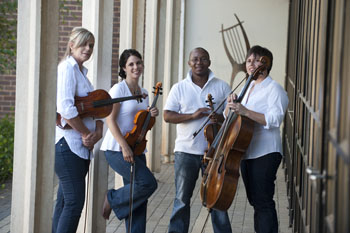
The members are, from the left: Jeanne-Louise Moolman; Sharon de Kock; Samson Diamond; and Anmari van der Westhuizen.
Photo: Supplied |
The Odeion String Quartet at the University of the Free State has a chance of winning a KykNet Fiesta award for the ‘Best Achievement in Classical Music’.
The Odeion String Quartet was nominated for this category in January and the winners will be announced at a swanky gala night in Sea Point, Cape Town, on 5 March 2015. Other artists nominated in the same category, include Magdalena Minnaar (singer), Elizabeth Frandsen (singer) and the composer, Braam du Toit.
The latter were all part of the Poskantoor opera production at Aardklop. Artists are nominated on the basis of successful and award-winning performances at national arts festivals.
During the 2014 KKNK, the Odeion String Quartet won a Kanna award “for the best Classical Music production, Homage, where we honoured local classical composers in the light of South Africa’s 20-year celebrations,” says Prof Anmari van der Westhuizen Joubert of the Odeion String Quartet.
“We were requested to pay homage to a variety of composers in the production, namely Mokala Koapeng; Pieter de Villiers; Allan Stephenson and Hendrik Hofmeyr. The guest artist at the festival was the singer Zanne Stapelberg.”
Another event where the Odeion String Quartet was honoured, was last year’s Vryfees. They received the award as Best Classical Debut Artist for their production Bits and Pieces. The quartet also received the UFS Alumni Ambassador award last year.
For more information or enquiries contact news@ufs.ac.za